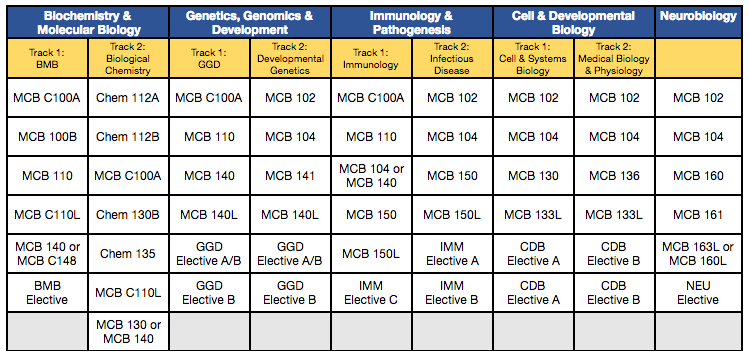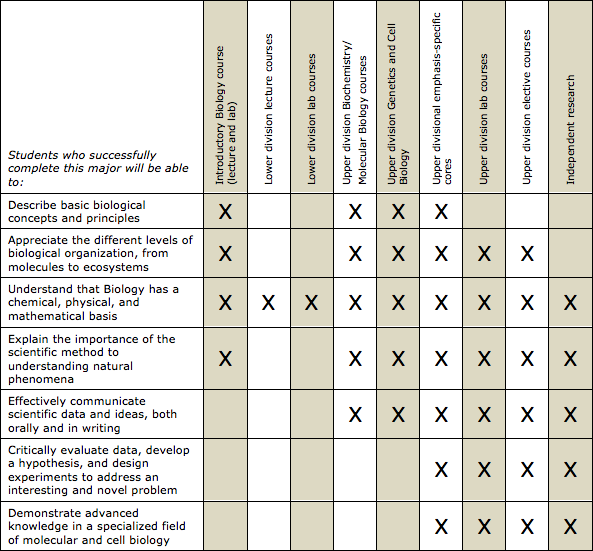Required Courses, Learning Outcomes, Assessment Methods, Curriculum Map
Department Mission Statement
The teaching and research activities of the Department of Molecular and Cell Biology (MCB) concern the molecular structures and processes of cellular life and their roles in the function, reproduction, and development of living organisms. This agenda covers a broad range of specialized disciplines, including biochemistry, biophysics, molecular biology, structural biology, genetics, genomics, bioinformatics, cell biology, developmental biology, tumor biology, microbiology, immunology, pathogenesis and neurobiology.
Description of the Undergraduate Major
The major in Molecular and Cell Biology (MCB) is subdivided into five emphasis areas: Biochemistry, Biophysics, and Structural Biology (BBS); Cell Biology, Development, & Physiology (CDP); Genetics, Genomics, Evolution, & Development (GGED); Immunology & Molecular Medicine (IMM); and Molecular Therapeutics (MTX). MCB also had an emphasis in Neurobiology until it was phased out in May of 2025 as a result of the creation of the new department and major in Neuroscience. All MCB students complete the same lower division coursework to gain critical training in Biology, Mathematics, Chemistry, and Physics. All or most lower division coursework is completed before major declaration. Upon declaring the major, MCB students choose an emphasis and a track within that emphasis. These choices constitute a specialization, which determines the core prescribed courses and elective options they will have as part of their upper division major curriculum. Students can choose among several areas of specialization; emphases are broadly defined along divisional lines and allow students to focus (within their Track) on a more defined topic within the MCB major. MCB students who elect to participate in independent research may choose from sponsoring research laboratories within any MCB division, or, upon approval, in laboratories outside the department (other UCB departments, LBNL, CHORI, UCSF, biotechnology companies). The MCB major provides excellent preparation for many careers and post-baccalaureate training programs, including graduate programs and heath-related professional programs (e.g., medicine, dentistry, optometry, pharmacy), science writing, law school, biotechnology, industry, teaching, and academic research.
Required Courses for the Major
Lower-Division Course Requirements (required of all majors):
|
Course Number |
Course Title |
Semester |
Units |
| Math 10A* | Methods of Mathematics: Calculus, Statistics, and Combinatorics | F, Su | 4 |
| Math 10B* | Methods of Mathematics: Calculus, Statistics, and Combinatorics | Sp, Su | 4 |
| Chemistry 1A/1AL ** | General Chemistry and Lab | F, Sp, Su | 3+1 |
| Chemistry 3A/3AL*** | Organic Chemistry and Lab | F, Sp, Su | 3+2 |
| Chemistry 3B/3BL*** | Organic Chemistry and Lab | F, Sp, Su | 3+2 |
| Biology 1A/1AL | General Biology and Lab | F, Sp, Su | 3+2 |
| Biology 1B | General Biology (includes lab) | F, Sp, Su | 4 |
| Physics 8A**** | Calculus-based Physics (includes lab) | F, Sp, Su | 4 |
| Physics 8B**** | Calculus-based Physics (includes lab) | F, Sp, Su | 4 |
|
*Any deviations from the required math courses should be approved the Undergraduate Affaris Office.
** Chemistry 1B (Sp, Su) is required for BBS Track 2 only. All other tracks only need Chem 1A/1AL. Chem 4A can substitute for Chem 1A/1AL. Chem 4B can substitute for Chem 1B for BBS Track 2 students.
***Chem 12A and Chem 12B is a highly recommended, but not required, substitution for 3A/3AL/3B/3BL for student intending to pursure BBS Track 2.
****Physics 7A can be taken in place of 8A and Physics 7B in pace of 8B.
|
|||
Upper-Division Course Requirements:

Student Learning Outcomes
Students who successfully complete this major will be able to:
- Describe basic biological concepts and principles,
- Appreciate the different levels of biological organization, from molecules to ecosystems,
- Understand that biology has a chemical, physical, and mathematical basis,
- Explain the importance of the scientific method to understanding natural phenomena,
- Effectively communicate scientific data and ideas, both orally and in writing,
- Critically evaluate data, develop a hypothesis, and design experiments to address an interesting and novel problem, and
- Demonstrate advanced knowledge in a specialized field of molecular and cell biology.
Assessment Methods
Molecular and Cell Biology uses performance on examinations and assignments as a measure of student comprehension of material taught in class and laboratory. Examinations take several formats, including short answer, essay, lab reports, lab practicals, and oral examination.
Nearly half (42%) of the students in the Molecular and Cell Biology major participate in independent research in a research laboratory located on campus, or at nearby academic institutions or industry. Students may receive academic credit for their research project (MCB 99, MCB 199, or MCBH196 (A or B) or may participate on a strictly volunteer basis. Students have many opportunities to present their work – written progress reports, poster presentations, and lab meeting presentations. Honors students must present their work orally or in poster format at an Honors symposium. Students who perform independent research report the experience as a highlight of their Berkeley education and that spending time in a research laboratory greatly enriches the classroom experience.
